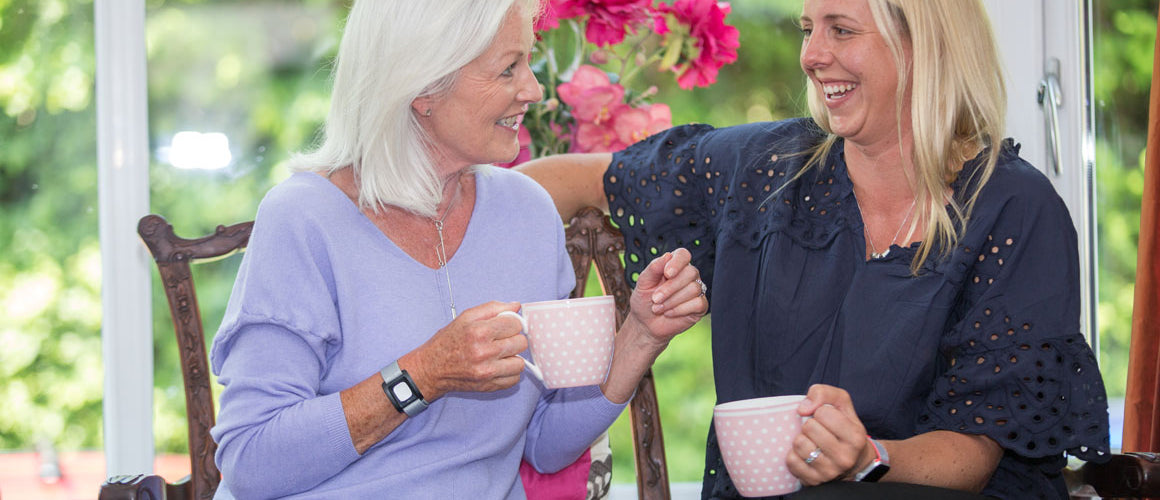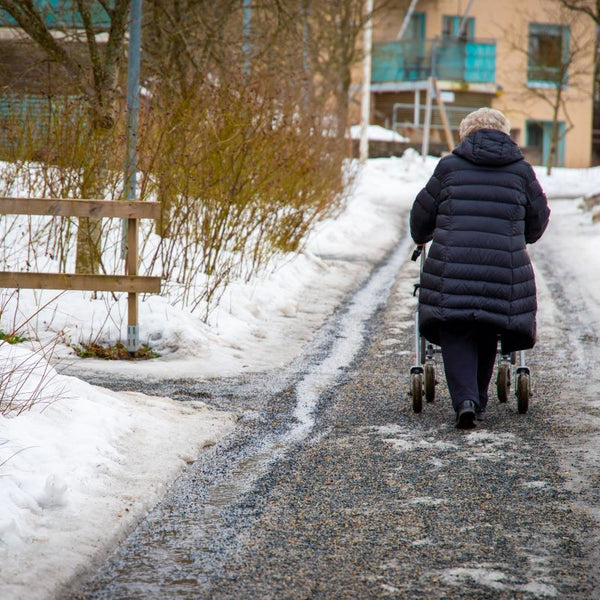Estimated reading time: 6 minutes.
Whilst ageing is an inevitable fact of life, many of us do not consider what the implications of getting older will be on our parents’ independence.
Knowing what care options are available and where to turn to for support can help you make an informed decision that will benefit you and your family.
In this guide, we discuss:
- Accepting your parents need care.
- Common concerns you may have about your parent’s care.
- 5 things to consider about your parent’s eldercare.
- Understanding your care options.
- Where to get further help.
- Resources for family carers.
Accepting your parents need care
No matter what our age, we tend to see our parents through the experiences of our childhood. They are the loved ones that taught us how to ride a bike, cooked our meals and helped with homework. We remember them as the ones we turned to when we wanted advice or a helping hand, even when we reach adulthood ourselves.
That’s why it can be so difficult to accept that our parents need caring for when they reach their later years. It can be a shock to accept that the strong figures in our lives are also vulnerable and it can remind us that we too are getting older.
We may not notice how ageing is affecting them because it is a gradual process. It may become noticeable when family get together over Christmas or when Mum or Dad have an unexpected fall or accident.
It can be difficult for our parents to accept also. When you have been proud and independent all your life, you may feel unable to ask for help and don’t want to be a burden to loved ones. Talking to your parents about their care options can be emotional and challenging for everyone involved. It helps to first accept the situation and understand what options are available. This can help you listen with an open mind to how your parents feel and the concerns they may have.

Common concerns you may have about care for your parents
Facing up to your concerns and talking about them with friends and family may help you come to terms with the situation. Common concerns include:
- How it will affect your relationship with your parents. Whether you suddenly become a carer or slowly fall into the role, you may worry about the commitment and how it will change the relationship with your Mum or Dad. You may feel anxious that the situation is outside of your control, resentment that you have to take on the role, anger at how it affects your lifestyle or fear about the future. These feelings are normal and valid. Organisations such as Carer’s UK can support you and you’ll find other people feeling similar emotions in their carers forums.
- What the future holds. Most of us worry about change and this feeling is exaggerated when it involves close family. Whilst ageing is out of our control, we can plan how we deal with it. Accepting the situation and knowing your options can at least partly address concerns about the future.
- How to pay for care. The financial implications of the cost of care can be daunting. However, there is some support available, for example the carers allowance, and not all care support is as expensive as you may fear. Become familiar with your rights as a carer and use charities such as Age UK to help you understand the financial support you could be entitled to.
- Whether your parents are OK when you are not with them. You cannot be with your parents 24 hours a day, even if they share a home with you. We can feel guilty when we leave them, however having your own time is important for your well-being. Knowing your parents can call for help should they fall or feel distressed means you can relax (even if a little!). Having a panic button or elderly fall alarm that Mum or Dad wear around their neck or wrist is a simple but potentially life-saving solution.

Five things to consider about your parents’ eldercare
There is no one-size fits all solution when your parents start to need a little help around the home. People age differently and the level of support they need will change as they get older or develop medical conditions.
- Involve your parents and the earlier, the better. It is their life and independence and they will have strong opinions about their care needs. Approach difficult conversations about care with patience and sensitivity. You may find our guide ‘Talking about future care options’ will help you reflect on how to broach the subject. Your parents may be reluctant to talk at first and if so, may react defensively.
- Share your concerns and responsibilities. If you have siblings or close family, talk to them openly about your worries and what the family can do to help. If other family members do not live as close to your parents as you, it may be difficult for them to accept the situation or to help as easily as they would like. However, honest and clear communication can make it easier to develop a care plan later.
- Be realistic about the support you can offer in the long term. Carers UK estimate 2.4m people are part of the sandwich generation, meaning they provide care for their own children and their elderly parents whilst juggling full time work and other commitments. Being an informal family carer can be an emotional and tiring responsibility.
- Their care needs will likely change over time. A care plan can help the family organise responsibilities and roles. However, bear in mind it will need to be flexible. The level of care your parents need today may be different in 12 months’ time if health issues change. When informal care no longer meets your parents’ needs, involve professionals early before the situation becomes overwhelming or more complex.
- If you take on the role of a family carer, remember that carers need care too. You need to take care of yourself to be able to care for someone else. Being a carer can be an emotional roller-coaster so make sure you have time for yourself and the support you need for your mental health.

Understanding your care options for ageing parents
Many of us still think of meals on wheels or nursing homes. Senior care is more nuanced than this, although the choices can be confusing if you are not familiar with the options.
Remaining independent at home
The vast majority of people want to remain in their own home as they get older. Home adaptations such as stair lifts, walk in baths and grab bars can help maintain independence.
Telecare devices such as personal alarms can provide a way to get help in an emergency. There are a range of alarm devices available, however they are generally monitored 24 hours a day by a specialist Emergency Resolution Centre that will alert the emergency services or friends and family when help is needed.
Telecare is a relatively inexpensive way to help someone remain safe at home, whilst providing you with peace of mind that they can get help when you are not around.
Different types of personal alarm provide varying levels of support depending on your parent’s needs:
- GPS personal alarms provide peace of mind for more active older people who like to get out and about. These work away from the home so you can be confident Mum or Dad can call for help should they fall when visiting friends or going to the shops.
- In home personal alarms for the elderly work in the home and garden so your parents can continue doing the things they enjoy around the home.
- Monitored telecare devices such as smoke alarms, smart home monitoring and monitoring systems for the elderly can help make the home safer and can be combined with a personal alarm as part of a safe home package.
- Dementia trackers and dementia alarms are simple GPS devices that are designed to find people living with dementia or Alzheimer's and may wander.
Real-life stories: getting a personal alarm
Home care
Your parents may benefit from a carer who visits regularly to provide services such as preparing meals, cleaning or bathing / washing. Some financial support from your local authority may also be available or there may be social services in your areas. Private companies such as Home Instead offer flexible care at home services. Even with home care, a personal alarm is a good idea so your parents can get help when their carer is not with them.
Live-in carers
Live-in carers provide round the clock care as well as companionship and support. They are an alternative to residential care. You may have natural concerns about such arrangements, however live-in care provides one-to-one support that can be invaluable for people living with conditions such as advanced dementia, Parkinson’s or Multiple Sclerosis or for those who need palliative care.
Sheltered housing / supported accommodation
If your parents want to live independently but need support then sheltered housing may be a solution. Sheltered housing properties are smaller and easier-to-manage homes. They often have a 24-hour emergency help system, communal areas and social activities for residents. A scheme manager or warden will normally be on hand to help, although features vary from scheme to scheme.
Assisted living communities
The differences between sheltered housing and assisted living communities is sometimes blurred, however assisted living housing normally provides more support and care. Whilst you remain living independently, there is assistance with tasks such as washing, dressing and going to the toilet. Unlike sheltered housing, assisted living is regulated by the Care Quality Commission (CQC). Nursing homes can be a type of assisted living solution.
Independent living communities
These are typically retirement communities, often with clubhouses and organised social activities. They are normally aimed at older adults who don’t need support with daily living but are attracted by the social interactions provided.
Living with family members
Privacy, space, independence and routines, as well as the cost of any home improvements required, are points to consider. However, if you have the space then for some people, this is an option that keeps their loved ones close.
Personal alarms for the elderly
Where to get further help
Fortunately, there are many organisations and charities who provide invaluable support and advice.
- Age UK: information and advice on everything from arranging care to benefits and legal issues
- Carers UK: caregiver support.
- NHS: a guide for people who have care and support needs, their carers, and people who are planning their future care needs. Includes information on respite care.
- Alzheimer's Society: Help with dementia care.
- Gov.uk: social care and carers allowance.
Resources for family carers
You may also be interested in these other advice guides from Taking Care:




